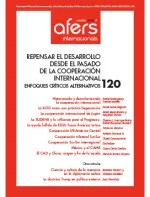Failed US assistance to Latin America? The case of Bolivia

Official Development Assistance (ODA) received a new boost at the start of the 21st century, but this did not translate into a meaningful decrease in poverty and inequality on the periphery. In Latin America, under the leadership of governments called progressive or post-neoliberal, significant advances were observed to this effect, with the Movement for Socialism (MAS) in Bolivia paradigmatic in terms of socioeconomice development and the political and cultural inclusion achieved. Beginning with a critique of US ODA to Latin America, and considering the case of Bolivia, this paper seeks to open up potential ways of underpinning a theoretical line in the political praxis of development that maintains a positive sense of this notion, and which is at the same time able to break with the neoliberal perspective and dispute the scepticism of post-structuralist radicalism.
Key words: ODA, development, state, inter-American relations, Bolivia, United States
DOI: doi.org/10.24241/rcai.2018.120.3.95
>> The full text articles of this issue are available only in Spanish language